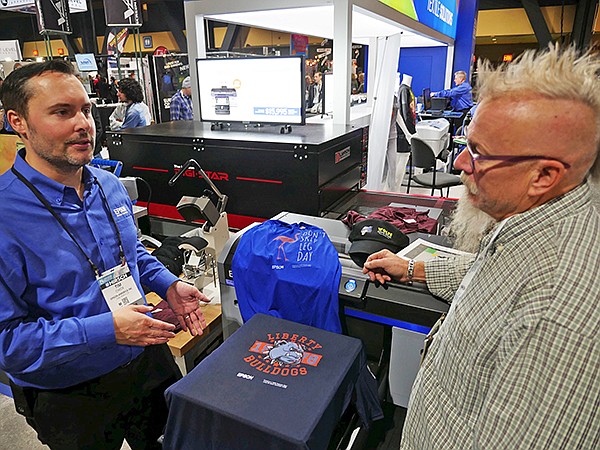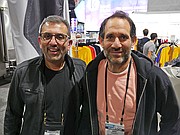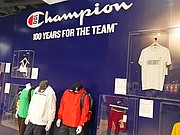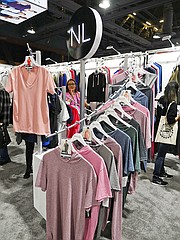DIGITAL DEMAND AT ISS
Digital Printing Is All the Rage at ISS
LONG BEACH, Calif.—Customization is on the rise.
That was the message at the Imprinted Sportswear Show, where exhibits pointed to the trend where consumers increasingly seek to shape the cuts and styles of their clothes.
The annual Southern California show, which ran Jan. 18–20 at the Long Beach Convention Center, is a sprawling event for T-shirt blanks, hoodies and embroideries, as well as for machinery to screen-print graphics on clothing.
The trade show this year covered 115,000 square feet of the convention-center floor while last year it encompassed 111,000 square feet, said Joshua Carruth, a trade-show director for Emerald Expositions, which owns ISS.
Attendance at this year’s show was basically even with last year’s show, which is frequented by printers, decorators, brand executives and people starting new brands.
For the past couple of years, designers have shopped ISS to find out which tech company could help them produce small runs of clothing for a market interested in customization. For this year’s show, the topic of customization gathered more momentum.
“Everything is about customization,” said Michael Sanders of True Value Fabrics, a textile supplier headquartered in Carson, Calif. “This used to be a show about blanks. Now it’s more of a digital show.”
Steve Nanino, president of the Los Angeles–based Kid Dangerous, which makes small runs of clothing as well as third-party brands, said that even though there are more digital printers around, he didn’t expect them to take over the industry.
“People are interested in digital printers. But they are inherently slower and more expensive than screen-printing. Until the digital side is able to get better, there is still a role for screen-printing. The biggest hurdle for digital is speeding up,” Nanino said. Many screen-printers have an advantage of offering quick return, he said.
ISS embraced that both technologies can co-exist. Show management exhibited an installation called the Innovation Zone, which documented the journey of a garment through a production cycle and featured both digital and screen-printing machines.
Israeli-headquartered Kornit Digital unveiled the Atlas print system at the show. The direct-to-garment printer includes a new ink set called Eco-Rapid, which offers more colors and is more durable. The machine introduces an intelligent-user interface to support self-service.
Also at the show, Irvine, Calif.–headquartered Roland DGA released the VersaSTUDIO BT-12. It’s a direct-to-garment desktop printer made for printing directly onto cotton products.
Technology company Epson displayed products such as its direct-to-garment polyester pretreatment. Tim Check of Epson America Inc. in Long Beach said the pretreatment solution was similar to putting a coat of primer on a wall. It ensures digital prints stick to polyester.
Danvers, Mass.–based company Inkcups exhibited a Brite Tagless printer, which is designed for printing highly opaque, white-colored inks on dark fabrics.
Making small runs of clothing was stressed at some brands displaying tees and blanks. Bayside Apparel showed garment-dyed crew-neck T-shirts, which could be produced at a run of 100 shirts at a time, said Jessica Escobedo, a brand representative.
A myriad of looks and styles of blanks was displayed at the show. At the Los Angeles Apparel booth, brand founder Dov Charney exhibited blanks made from coarser threads, which produce heavier T-shirts. It was a change from the lighter, fitted blank that was popular at American Apparel, Charney’s previous company.
Champion, a division of Hanes Brands, celebrated the 100th anniversary of Champion by reissuing some of its most popular looks from past years but with new fabrics. Looks included ringer tees and three-quarter-sleeve baseball tees.
Gildan released a polo shirt that wicks away sweat. Jeff Cooper, Gildan’s vice president of marketing, described the garment as a polo made with performance fabrics. The company also released new colors for its fleece program, including azalea, mint green, orchid and violet.
Downtown Los Angeles–headquartered Blanks Plus showed its Moco brand. The line of T-shirts, manufactured in Los Angeles, is made with MicroModal fabric and the company’s Eco-Hybrid fabric.
Irwindale, Calif.–headquartered Lane Seven Apparel exhibited its new, heavyweight pullover hoodie. Los Angeles–based Next Level Apparel displayed a new line of relaxed women’s tops.
While all sorts of styles of tees were offered, heavy, box-shaped T-shirts were en vogue, said Justin Bautista, co-owner of Tilted Brim, a San Francisco boutique. “T-shirts with extended hems have come and gone,” he said.
Popular graphic styles included big logos on the back of T-shirts, as well as chest hits and a graphic on the top left-hand side of the chest, he said.
Cotton Heritage, headquartered in Commerce, Calif., offered new categories including a women’s line of pullovers, zip hoodies and jogger pants. Previously, Cotton Heritage only produced unisex hoodies and jogger pants. “They will be better-fitting garments,” said Ken White, Cotton Heritage’s vice president of sales. The brand also introduced new garment colors including artichoke, dusty rose, agave green, shale blue and antique gold.
Business was good at ISS, White said. “It was well attended. There were great meetings with customers and potential customers. We worked with screen-printers who we have worked with for a long time. We saw a lot of brands looking for new blanks. They were looking for new colors and new silhouettes,” he said.

























